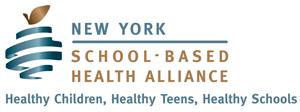School-based health centers (SBHCs) are the ideal location for primary care and mental health staff to collaboratively address students’ physical and mental health needs – leading to greater success in school and in life.
- Seventy-five percent of SBHCs have a mental health provider.1
- In studies of SBHC service utilization, mental health counseling is repeatedly identified as the leading reason for visits by students.2
- One 1998 study found that adolescents who had access to SBHCs were ten times more likely to make a mental health or substance abuse visit than those without access to an SBHC.3
- In one study, inner-city students were 21 times more likely to make mental-health related visits to SBHCs than to community health centers.4
- A national survey of SBHCs found the following mental health and counseling services are provided at SBHCs where mental health professionals are included as center staff: crisis intervention, mental health assessment, grief and loss therapy, substance use therapy, mediation, and others.1
- School-based health centers offer high quality mental health care by using an integrated strategy for addressing health and mental health issues. Several studies have shown that the barriers experienced in traditional mental health settings (2) – stigma, non-compliance, inadequate access – are overcome in school-based settings.2,5
- One study found that students served by SBHCs had fewer discipline problems, course failures, and school absences.6
1. Strozer J JL, Ammerman A. 2007-2008 National School-Based Health Care Census. . Washington, DC: National Assembly on School-Based Health Care;2010.
2. Waszak C, Neidell S. School-Based and School-Linked Clinics: Update 1991. Washington, DC: Center for Population Options; 1991.
3. Kaplan D, Calonge B, Guernsey B, Hanrahan M. Managed Care and School-based Health Centers: Use of Health Services. Archives of Pediatric and Adolescent Medicine. 1998;152:25-33.
4. Juszczak L, Melinkovich P, Kaplan D. Use of Health and Mental Mealth Services by Adolescents Across Multiple Delivery Sites. Journal of Adolescent Health. Jun 2003;32(6 Suppl):108-118.
5. Anglin TM, Naylor KE, Kaplan DW. Comprehensive School-Based Health Care: High School Students’ Use of Medical, Mental Health, and Substance Abuse Services. Pediatrics. 1996;97(3):318-330.
6. Jennings J, Pearson G, Harris M. Implementing and Maintaining School-Based Mental Health Services in a Large, Urban School District. J Sch Health. May 2000;70(5):201-205.
Resources for SBHC and Staff
- National Center for School Mental Health: Advancing Comprehensive School Mental Health Systems: Guidance from the Field
- Behavioral Health: An Adolescent Provider Toolkit
- National Assembly on School-Based Health Care: Using Coordinated School Health to Promote Mental Health for All Students
- Eliminating Barriers to Learning Through the Early Identification of Student Mental Health Issues: Trainers’ Guide
- Resources for Dealing with Traumatic Events in Schools
- Coping With Grief After Community Violence
- Preventing Suicide: A Toolkit for High Schools
- Mental Health & COVID-19 in Schools
General Resources
- Substance Abuse and Mental Health Services Administration
- Mental Health Association in New York State
- Mental Health Matters: a program of the Mental Wellness Center (MWC)
- Know the Signs
- Talk About Mental Health: resources for young people, educators, friends and caregivers how to start a conversation on mental health
- Get trained in Mental Health First Aid: Mental Health First Aid (MHFA) is a free workshop available in multiple languages, offered in every borough in NYC, every week.
- Mental Health in African American communities
- Trevor Project: mental health resources for LGBT+ youth
